- Home
- Steve Erickson
Amnesiascope Page 14
Amnesiascope Read online
Page 14
There is a little blonde hooker I see now and then on Sunset Boulevard. She is always there at dusk in Zed Time, on the corner across from the Chateau Marmont: I call her the Princess of Coins, from the American Tarot. She glistens conspicuously. Get close enough to her and she’s younger than you thought; the girls on this stretch of the Strip are always either younger or older than you thought, if you ever get that close. At any rate she’s young enough to still be on the street, before the law of desire either places her in some guy’s penthouse or renders her old, or kills her: she glistens too conspicuously to remain on the street for long. I look for her whenever I drive by this way. I have no serious thought of employing her, but since she’s more appealing than most of the hookers I’ve seen, and since she stands not four blocks from where I live, I find myself wondering what it would be like to buy her and take her home. I can still remember years ago walking down a street in Amsterdam past all the women in the windows, one in particular sitting in her window in black hair and a soft white turtleneck sweater, smiling and saying nothing, knowing I wanted her but had neither the money nor the nerve, and knowing as well that years later I would vividly remember the missed opportunity. But the Princess of Coins, years later on Sunset Strip across from the Chateau Marmont in Zed Time, is too young and unwise to smile like that. Hers are the young smiles that vanish instantly in my rearview mirror when I pass her by. …
I was at Viv’s one evening and had what I thought was a dream. The sun was going down and I was about to leave, because Viv was expecting some friends over in an hour or so for a Night of Women; but I went up to the overhanging platform and lay down on her bed, and I must have drifted off. I don’t remember being so particularly tired. At some point I woke, or I dreamed that I woke, and the women had arrived and were down below the loft, talking; I wasn’t conscious enough to make out what they were saying. I don’t know if they were indifferent to my being up there or had just forgotten it. But slipping in and out of sleep, I woke again to the flickering of candlelight on the ceiling above me, and turning over I peered over the edge of the bed at all the women below me who, eight or ten of them, were naked. Some of them I recognized. I was pretty sure I saw Veroneek and Lydia and even Amy Brown, along with several of the artists who had been at the ball. They weren’t saying much, just whispering among themselves while they shaved each other. Little bowls of soapy water sat between the legs of the four or five women being shaved by the other four or five who very intently dipped the tiny razors into the water and continued until the work was finished. There was nothing especially precious or ritualistic about it; rather the bare, glistening women seemed to be mapping, between the lines of a commonly held secret, their own country that was inviolate to any man, whether or not they knew or cared that he might be up in bed on the platform above them watching. I was lulled by the sight and silence of it; and I can’t remember if I just turned away and closed my eyes or kept watching, but I could see emerge through the pubic hair as it was shaved away the tattoos that had been hidden underneath, the Nine of Bridges and the Ace of Rifles, the Six of Stars and the Five of Coins. In the juxtaposition of their bodies I read my fortune—a foggy destiny and newly revealed crossroads, where the name of the bridge before me was written on a sign in an amalgam, and right before waking I almost deciphered the letters long enough to make it out. Later when I woke the women were gone. I went downstairs in the dark and turned on the light, and there was no sign of razors or bowls of soapy water, but looking closely at the floor I ran my finger through the small silky hairs that had slipped by the women’s effort to remove all traces of what they had done.
Not long after our night with Jasper, Viv showed me her plans for a new sculpture. She calls it the Memoryscope. It is to be twenty feet long, cylindrical like a telescope and made of steel, and will stand perched in the sky. Lining the inside along the bottom will be a mirrored strip that runs from one end to the other, so that when the sun rises to a certain point, the telescope will flash a blinding light. In this light, Viv explains, one will see the memory he or she has most forgotten. Once she has finished this telescope shell determine the coordinates of its aim, wherever that might be—the Rockies, Chicago, Nova Scotia—and build there another telescope, aimed back at Los Angeles. Obviously it is an impressive, ambitious plan; Viv has spoken to Jasper about erecting it in the moat of fire that surrounds Jaspers house, or maybe the junkyard beyond, within view of one of the garrets. I sense this is Viv’s gift to Jasper, to revive Jasper from what she perceives to be the deluded despair of her memories even as it would revive Viv herself from her own doldrums after the Artists Ball and the filming of White Whisper, not to mention a growing ambivalence about the direction of her life, the sense that some thing is slipping through the cracks. …
Last week I had dinner with Dr. Billy O’Forte, in a little steak joint near the old pier. “You know,” he said of Viv, “she’s better for you than anyone you’ve ever been with,” and once I was too young and stupid for that to have meant anything. But then life passes by and, almost unnoticed to you, the curve in the hill that has always been upward suddenly turns downward, and what and who are good for you means something. Viv is my Queen of Stars. She’s the face of a dream that waits for the flash of sunlight along a strip of mirrors before it explodes into recognition, which may be to say that Viv is not the face of my dream but that my dream is the face of Viv: at any rate she is the face of my reality, which has become a much better thing than my dreams. Part maternal caretaker and part eternal ten-year-old tomboy, part romantic commando and part sexual guerrilla, Viv careens between the extremes of scandal—it’s all one can do to hold her back from jumping on the Cathode Flower stage and taking her clothes off with the strippers, and there was one month she seriously considered a job as a go-go dancer in Tokyo—and a kind of saintliness, giving a bum on the street her last twenty because she has nothing smaller. For the first year, we were together only because we couldn’t stay apart, our bond made not out of dreams but our irresistible fucking; sex bound us when everything else, the past and future in particular, tried to break us down. And then not so long ago came the moment when both the past and the future rushed into the present and all the wounds I inflicted on us and all the promises that had been implied between us presented themselves to be answered for. When amnesia broke, through its gate marched every person I ever hurt, one after another, and I broke down one afternoon in a little diner on La Cienega Boulevard, sobbing into my cheeseburger while the other patrons hastily paid up their tabs and bolted, as though fleeing the spectacle of an epileptic fit. I cried from the diner to the parking lot, I cried from that afternoon to that night, all the way home and into the next day. I cried for Viv, I cried for Sally, I cried for the women I hurt before Viv and after Sally, I cried because my father was dead, I cried because someday my mother would be dead, I cried for my conscience and my faith. I cried for my dreams. I was quite a basket case that day, when amnesia broke and I remembered again; I cried for all my failures, and for that moment’s failure in particular: the failure to transcend memory.
Sally called last night. Viv was over at my place in a foul mood, wondering why none of her film work was bringing her any real money—and if she wasn’t making money, then what was the point, and why wasn’t she doing what she really wanted to do, like building her Memoryscope? In the midst of this serious discussion the telephone rang, I answered, and it was Sally. Of course Viv knew immediately. Later she accused me of “practically cooing,” though I know from the sound in Sally’s voice that to her I seemed as cold as ice; it’s funny that two women can hear exactly the same thing at the same time and hear not entirely different words or meanings, which one might expect, but entirely different heartbeats and temperatures. Sally was more right than Viv. I was colder than I was cooing. We hadn’t spoken since she got married. Typically, she was in town for only one night and calling at the last minute to say that Polly was with her, and wondering if I wanted to have breakfas
t with the two of them in the morning. I answered that it wasn’t possible. She asked how I was and I answered that I couldn’t talk. She rushed to hang up, either right before or after I began to add, “Let me know if—”
Let me know, I began to say, if you ever come back to L.A. Viv, already in the furious throes of a full moon, was on her way out the door before I stopped her. I knew that later she’d regret going, and that I’d regret letting her go. “She couldn’t care less whether you see Polly,” Viv answered bitterly. Viv thinks the worst of Sally partly because she needs to, because she feels that Sally stole something that was Viv’s before Viv and I ever knew each other existed, and because she believes she’s worthier of it than Sally ever was. As to whether Sally truly cares or not that I see Polly, I don’t know. I believe she does, but it doesn’t matter; what matters is that over the weeks and months and years, I haven’t been able to get Polly out of my mind. I was a father to her even as I was never the father she wanted. I was the one who bathed and fed and read her stories and put her to bed when her father was off strumming his guitar and listening to people tell him he was a genius and basking in little Polly’s distant adoration, and the knowledge that besides being a genius he was the world’s best-loved father. And then one day I disappeared. I cut her off as I cut off her mother, as I cut myself off from the past and from my memories one by one, because I wasn’t brave or strong or big enough to rise or at least sidestep the pain long enough to see a little four-year-old kid for an hour or two now and then. My pain was pretty petty compared to the confusion she must have felt; and it was my choice, after all, because she was four years old after all, so it couldn’t very well have been her choice. Later I told myself I did it because my continued presence in her already confused life could only compound the confusion; and I knew that was a lie as soon as I tried to convince myself I believed it.
Polly isn’t all the guilt I have left, just one of the biggest parts of it. It bobs in the arctic stream of my memories like the shard of ice from a much larger block in the far distance, along with smaller receding shards. There is the guilt about my marriage. There is the guilt about Viv and the pain of our first year. There is the guilt about Christina, a low-rider in a black beat-up T-Bird and a lazy Cheshire smile and a beauty mark over one eyelid, who I knew after Sally and whose time and faith and warmth I cavalierly used up and wasted; I came to feel a great affection for her even after our passion was over, at a time when I could not yet pinpoint any capacity for love I might still have, and even now I still miss that affection. Little pieces floating in the cold current: a string of bedded women who claimed they expected nothing when I knew they expected everything, but I accepted their disclaimers anyway so I could have their bodies for a moment and release into them all the pain that can be released but none of the pain that can’t. Farther back is the guilt about my father’s death, as banal as it is universal, over things unsaid and gestures unmade: “If you have anything to tell him, tell him soon,” my mother, crying, warned me two weeks before he went. Left to my own devices, I can drown in guilt. I wake in the night to a wave of it suspended high above me in the dark. Part of me has been hoping for it; sometimes I wonder if it is less a barometer of my morality than another expression of my ego—vanity disguised as evidence that I still have a conscience. Then I turn on the light. I think about Sally and the wave vanishes, because about Sally of course there is little guilt, which is why she’s been such a luxury to me for so long, and why I was so reluctant for so long to give her up. The pain of Sally is cleaner, and there hasn’t been that much pain in my life recently in which I could pretend to be so pure. But then Sally calls and I hear her voice full of sadness and trepidation, and the pain isn’t quite so clean anymore; and then I remember Polly, and everything else is remembered again too.
Here, in the Last City of the Last Millennium, I have meant to defeat guilt and memory once and for all, though I know the effort is doomed. It isn’t an amnesia of the mind I pursue, or an amnesia of the heart; it is rather an amnesia of the psyche that sets me free. I’ve been working on my stutter. I almost lost it for a while but I’ve gotten it back, better than ever. I open my window and lean out into the street and stutter at the world, frightening animals and alarming somnambulists and causing cars to swerve. Every word ricochets in the back of my throat until I achieve true senselessness, until not a line of communication with anyone else is left, until every exchange is irrevocably rude. Standing in the shadows of street corners I open my mouth and let go at the passersby. It’s more than a hesitancy, it’s more than a slight tension in the larynx, it’s a full assault. In the movies the stutterer is always the one unhinged, the one so pathetically weak he winds up hanging himself, once he has fulfilled his function of giving the audience a good belly laugh. My stutter is different. Mine is a stutter, refined by the day, perfected by the minute, that will drive everyone else to hang themselves. People clear a path at my approach; they hear it coming, like a siren or an alarm. Every memory I have left tangles on the inane bursts from my lips like the words tangling on my tongue. The only sound I don’t stammer is the moan of my orgasm. But I’m working on it.
In the Stutter was born the Dream. I don’t remember my first word, I don’t remember my first stutter, but I’m told they were not the same, that my first word was stammer-free; thus, the moment of my truest eloquence was the moment of my earliest communication, back before the beginning of memory. Did I best know myself then, before the stutter, or have I come to know myself best since, when who I am has been defined by the stutter? I don’t have an answer. The stutterer is both the person I really am, and someone I am not. He is the intermediary through which I’ve been forced, by the impairment of my speech, to reveal myself to the world. But whatever passed through my mind the first time I stuttered, at the age of four or five, whatever awful virgin humiliation was breached, only to be compounded over the years, then the decades, through childhood and adolescence into youthful manhood to the shores of middle age, I’ve forgotten. I’ve wiped it away. Everything about me has felt fundamentally flawed since, in the way I suppose everyone feels a fundamental flaw. But my flaw is only a secret from everyone else as long as I keep my mouth shut. Beginning with the simplest introduction—“My name is …”—my secret is revealed, since my own name has always been one of the most impossible words to express fluidly.
Here are the rules: I can talk about this, you can’t. The most casual reference to it by another person still humiliates me. That I might make it a matter of public record does not mean I’m open to discussion on the subject. I will fool you from time to time; sometimes I won’t do it at all. Some years back, giving a reading in a book store, I was asked about it afterward. “But you haven’t stuttered once,” someone piped up from the crowd of listeners, expecting I’d find the observation reassuring. “Oh,” I said, “you wanted the stuttering version? I didn’t know that. I only do that when I want to amuse people. No, this was the Top Forty version—the stuttering version is the dance mix. Less melody and more percussion, and it goes on all night. …” No one ingratiates him or herself, no one worms his or her way into my confidence, by initiating a discussion on stuttering. I remember a counselor, later in life, long after the Stutter School, advising that a stutterer “must face his stuttering,” as though the stutterer is not confronted by his stuttering every moment. As though every moment of the most perfunctory social intercourse does not involve the choice to speak or not, does not involve a hundred rapid-fire decisions having to do with word selection, phrasing, the mad dash or the clandestine tiptoe across the minefield of semantic bombs, verbal spasms, rhetorical tics waiting to detonate on the end of one’s tongue. And between the utterance of the sound, and the act of violation by which the stutterer listens to himself, the minefield is crossed back, the return journey made to some private painful assessment by which he concludes: “It didn’t sound so bad, did it? It was almost sonorous, wouldn’t you say?” It may be that the stuttering of the pa
st wasn’t as bad as I remember, but only in the same way the stuttering of the present is always worse than I hear it, until I play my voice back, on a tape perhaps, to my own appalled realization.
Listen. I don’t know another way of talking about it that doesn’t skirt some sordid spectacle of self-pity, self-absorption, self-loathing. And rather than risk any of those, I’d as soon take everything back, and forget about it, and pretend, as I’ve always pretended, that the man who writes these words on paper is the true one, rather than the one who spits them out fitfully. I come from a long line of stoics: Scandinavian, Celt, American Indian. Blabbermouths these people are not. It’s possible that if I’d never stuttered, I never would have become a writer, though we’ll never know. But whatever imagination I was born to proved to be, from the beginning, the only safe haven when the stuttering began; and whatever grand vanity I might have begun to form was cut off at the knees or, more precisely, the throat. In the interior of my imagination, my words always belonged to me, I did not belong to them. In this interior as well, only I could know my own integrity when I was seven years old and the teacher called my mother to complain I must have plagiarized the short story we were assigned to write, since my strangled speech offered no convincing evidence I could even read, let alone write. It was ten years before anyone was truly convinced. By then, if teachers and principles were ready to concede I could indeed write the things I claimed to have written, they argued nonetheless that these were not the sort of things I should be writing. It was too late. Having asserted my imagination and won my voice, I would not give them back.
Well, I couldn’t give them back, could I? What of me would have been left? A stutter or silence. I had been a little seven-year-old kid, after all, with everything I was and everything I dreamed of being shrouded by the static of my own mouth; until I broke through. And then I had gone too far to surrender the word, and the more forbidden it was, the more irrevocable was my claim to it. Much later, buried under all the unpublished manuscripts and all the years piling up right behind them, I might very well have surrendered the word if it would have left me anything but faceless, voiceless, beingless. By the end of those fifteen years that stretched from twenty to thirty-five, when I had so futilely tried to become a published novelist, I had long since crossed the terrain of dejection to despair: but in the Stutter was born the Dream, and it pushed me from one effort to another across so much defeat that when the breakthrough finally came, modest as it was, it commanded that I destroy everything that had come before, including the pile of unpublished manuscripts. And because that small breakthrough had seemed so elusive, such a monstrous mountain to scale, I had this idea that once having scaled it, everything else about the Dream would finally lie at my fingertips. Having caught the tip of the Dream, I assumed the rest of it was simply to be taken. I don’t know why, five novels later, it didn’t happen. Any conjecture would only sound graceless, bitter, self-justifying. I’ve seriously considered the most obvious answer, that I was never as good as I hoped or wanted to believe. That the Dream was fantastic relative to what my talent really was. Looking back I can’t help seeing the worst: my insights as trite, my imagination as second-rate, my facility for words only as glib as I always wished my talk could be. More than that, I see my faith in myself as most counterfeit of all. Looking back, I’m not sure now I ever believed the Dream was really possible. Because if in the Stutter was born the Dream, in the Doubt was born the Stutter, and so the Dream was always infected by Doubt. I’ve thrust myself forward not out of faith or even will but the sort of primal force of habit that moves an animal to the place that nature commands it, to graze or mate or die; and somewhere past the rubicon of inspiration’s replenishment, where I was emptying myself more than I was refilling, and even though I didn’t really believe the harshest words of my harshest review, which suggested, like the second-grade teacher, that I was really nothing more than a glorified plagiarist, the Doubt could not help but still assume it was one more thing I was guilty of.

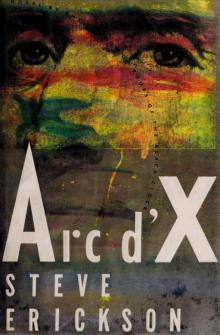 ARC D’X
ARC D’X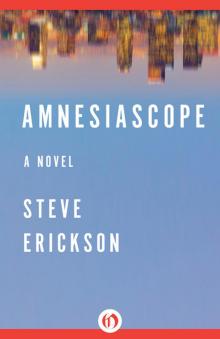 Amnesiascope
Amnesiascope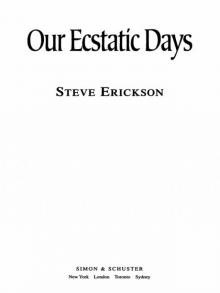 Our Ecstatic Days
Our Ecstatic Days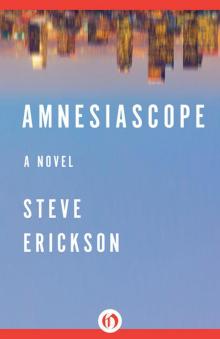 Amnesiascope: A Novel
Amnesiascope: A Novel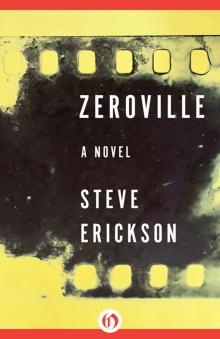 Zeroville
Zeroville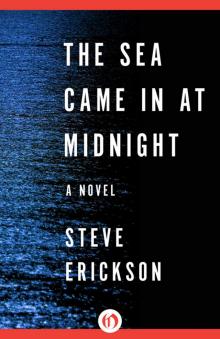 The Sea Came in at Midnight
The Sea Came in at Midnight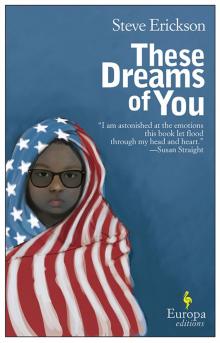 These Dreams of You
These Dreams of You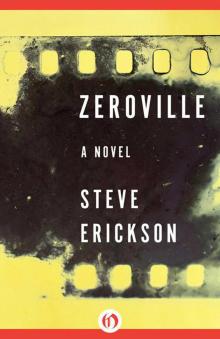 Zeroville: A Novel
Zeroville: A Novel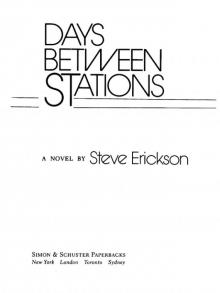 Days Between Stations
Days Between Stations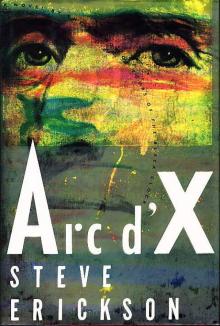 (1993) Arc d'X
(1993) Arc d'X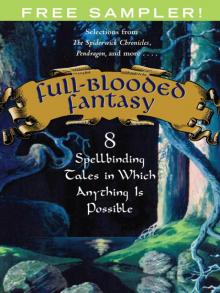 Full-Blooded Fantasy
Full-Blooded Fantasy